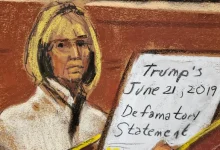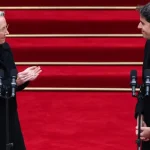
Cambridge is world-famous, but away from its colleges and cobbled streets, a legal row is brewing over rights to the city name. How far can its university go to protect its intellectual property, and what is it like to take on the 800-year-old institution?
Tahl Holtzman applied to trademark the name of his company, Cambridge NeuroTech, in 2017.
He thought the process would “be a breeze” and waited for a window for objections to close.
But “on the very last day – five minutes to midnight” he was told of formal opposition from “the Chancellor, Masters and Scholars of the University of Cambridge”.

He recalls “bewilderment” at what he felt was the university’s claim to “own the word ‘Cambridge'”.
“It’s quite bizarre for any entity to claim they own a geographical location,” says Mr Holtzman, 45.
“It’s sort of a Lords-and-peasants kind of situation where ‘I’m the Lord of this – I own Cambridge.’
“I think it’s particularly unhelpful – indeed harmful – in the Cambridge bubble for the university to stifle start-ups who quite rightly want to say ‘We are located in Cambridge, therefore it’s part of our trading name and trademark’.”
The university disputes claiming to “own Cambridge”, but does hold trademarks for “Cambridge” in several classes, for both goods and services.
These trademarks cover hundreds of items from “university education services” and “teaching apparatus and instruments” to “stickers”, “bibles” and “satellite telephones”.
When it first applied to register the trademark, it argued “Cambridge” was often used to refer to the university or its work, which gave the trademark so-called “acquired distinctiveness”.
It means the institution can try to stop others using “Cambridge”, if it feels its brand might be harmed.
Companies that work in unrelated fields have been free to use the city’s name in theirs.

Mr Holtzman says the 18-month legal battle cost his company £30,000, after which it was allowed to register a trademark for goods but not services.
“Cambridge NeuroTech” was, he adds, “the most natural choice” of name for a company that designs equipment for neuroscience research.
“I’m based in Cambridge and ‘neurotech’ is an abbreviation for neurotechnology,” he says.
“I wasn’t going to call it ‘Oxford NeuroTech’.”

Mr Holtzman says the university filed “350 pages of evidence” for his case, driving up his firm’s legal fees.
“The first thing that came to mind really was David and Goliath,” he says.
“They can outspend you and they don’t care how long it takes.”
The university has opposed other trademark applications, including for:
- Cambridge Football Club
- Cambridge Spark
- Cambridge Blue lager
- Cambridge Quantum Computing
- Cambridge Molecular
- Cambridge Rowing
- Cambridge Clinical Laboratories

Tony Cooke, chief executive of Cambridge Clinical Laboratories, says his company spent £26,000 fighting to register its trademark.
A letter from the university’s lawyers said the company’s proposed name was “highly concerning”.
Mr Cooke says it was “arrogant” and “selfish” of the university “to think that you own a geographic location”.
“It felt like they were a big entity and we were a small entity, and they would try and push us into capitulating,” he recalls.
“Cambridge is a very significant city, but it’s not just the university.”

Since 2018, several Intellectual Property Office (IPO) hearings have been held after the university opposed trademark applications.
In one decision, hearing officer George Salthouse wrote the university “clearly suffers from the delusion that it owns the rights to the term Cambridge no matter what field of activity is involved”.
He added that “the days when the then town of Cambridge revolved entirely around the University have long since disappeared”, though he accepted it had a reputation for things like publishing and higher education.
Mr Salthouse dismissed the university’s objections, but his decision was partially overturned in an appeal that found he “fell into error” when assessing evidence of the university’s reputation for scientific research.
The company involved – Cambridge Quantum Computing – was said to have spent more than £50,000 preparing its case. It was allowed to register trademarks, though the appeal limited some services in one class.
Many organisations in the city have successfully registered trademarks including “Cambridge”.
According to IPO records, membership organisation Cambridge Network, drinks maker Cambridge Distillery and dental firm Cambridge Whites all registered their names without any formal opposition.

Beth Collett, a barrister specialising in intellectual property and trademarks at 8 New Square chambers, says a trademark is a “registered right” that allows the owner “to prevent other people from using that sign”.
She says: “In order to get one, you have to show what the sign is that you’re seeking registration for and it has to be registered in respect of specific goods and services.”
Registering a place name is not allowed without “acquired distinctiveness”. A trademark applicant would need to show the name “doesn’t just mean the place, but it means something else in respect of the goods and services for which it’s been registered”.
“So the University of Cambridge, I think it’s fair to say, is entitled to claim that ‘Cambridge’ means something specific and, indeed, it means them in respect of various services; for example, educational services.”

In a statement, a university spokesperson says “polling shows that the vast majority of the public associate the word ‘Cambridge’ with the University, especially in education, research, innovation and related areas”.
The statement continues: “We protect the Cambridge name where there’s a risk of confusion with the work of the University. This is to prevent people from being misled and to support our global mission in education, research and innovation.
“We do not claim to own the rights to Cambridge across all fields of activity and have never done so.
“Our aim is always to work with people to agree a way forward that is beneficial to everyone involved.
“We will only pursue legal action if we believe our rights are being infringed, or if organisations are trying to trade on the University’s reputation or mislead the public into thinking their products and services are associated with us.”








